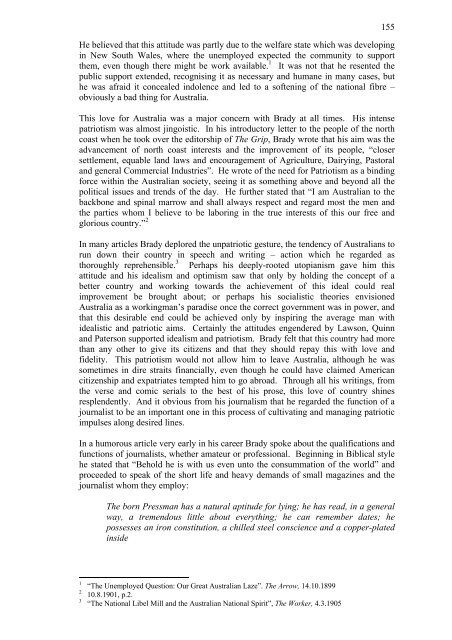A CRITICAL BIOGRAPHY OF EDWIN JAMES BRADY - Mallacoota ...
A CRITICAL BIOGRAPHY OF EDWIN JAMES BRADY - Mallacoota ...
A CRITICAL BIOGRAPHY OF EDWIN JAMES BRADY - Mallacoota ...
Create successful ePaper yourself
Turn your PDF publications into a flip-book with our unique Google optimized e-Paper software.
155<br />
He believed that this attitude was partly due to the welfare state which was developing<br />
in New South Wales, where the unemployed expected the community to support<br />
them, even though there might be work available. 1 It was not that he resented the<br />
public support extended, recognising it as necessary and humane in many cases, but<br />
he was afraid it concealed indolence and led to a softening of the national fibre –<br />
obviously a bad thing for Australia.<br />
This love for Australia was a major concern with Brady at all times. His intense<br />
patriotism was almost jingoistic. In his introductory letter to the people of the north<br />
coast when he took over the editorship of The Grip, Brady wrote that his aim was the<br />
advancement of north coast interests and the improvement of its people, “closer<br />
settlement, equable land laws and encouragement of Agriculture, Dairying, Pastoral<br />
and general Commercial Industries”. He wrote of the need for Patriotism as a binding<br />
force within the Australian society, seeing it as something above and beyond all the<br />
political issues and trends of the day. He further stated that “I am Australian to the<br />
backbone and spinal marrow and shall always respect and regard most the men and<br />
the parties whom I believe to be laboring in the true interests of this our free and<br />
glorious country.” 2<br />
In many articles Brady deplored the unpatriotic gesture, the tendency of Australians to<br />
run down their country in speech and writing – action which he regarded as<br />
thoroughly reprehensible. 3 Perhaps his deeply-rooted utopianism gave him this<br />
attitude and his idealism and optimism saw that only by holding the concept of a<br />
better country and working towards the achievement of this ideal could real<br />
improvement be brought about; or perhaps his socialistic theories envisioned<br />
Australia as a workingman’s paradise once the correct government was in power, and<br />
that this desirable end could be achieved only by inspiring the average man with<br />
idealistic and patriotic aims. Certainly the attitudes engendered by Lawson, Quinn<br />
and Paterson supported idealism and patriotism. Brady felt that this country had more<br />
than any other to give its citizens and that they should repay this with love and<br />
fidelity. This patriotism would not allow him to leave Australia, although he was<br />
sometimes in dire straits financially, even though he could have claimed American<br />
citizenship and expatriates tempted him to go abroad. Through all his writings, from<br />
the verse and comic serials to the best of his prose, this love of country shines<br />
resplendently. And it obvious from his journalism that he regarded the function of a<br />
journalist to be an important one in this process of cultivating and managing patriotic<br />
impulses along desired lines.<br />
In a humorous article very early in his career Brady spoke about the qualifications and<br />
functions of journalists, whether amateur or professional. Beginning in Biblical style<br />
he stated that “Behold he is with us even unto the consummation of the world” and<br />
proceeded to speak of the short life and heavy demands of small magazines and the<br />
journalist whom they employ:<br />
The born Pressman has a natural aptitude for lying; he has read, in a general<br />
way, a tremendous little about everything; he can remember dates; he<br />
possesses an iron constitution, a chilled steel conscience and a copper-plated<br />
inside<br />
1<br />
“The Unemployed Question: Our Great Australian Laze”. The Arrow, 14.10.1899<br />
2<br />
10.8.1901, p.2.<br />
3<br />
“The National Libel Mill and the Australian National Spirit”, The Worker, 4.3.1905


